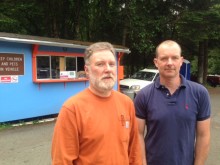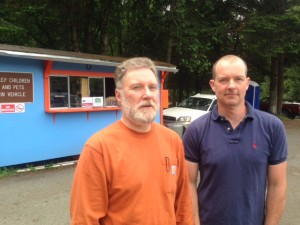— from Orcas Recycling Services/The Exchange —
As Memorial Day marks the start of the summer season, the island is preparing itself for population increase. As more people enjoy Orcas, more waste is produced. How will Orcas Island deal with its waste?
Although Jocelyn Cecil, server at Island Hoppin’ Brewery, actively recycles, she admits she doesn’t always know what is recyclable. “I know generally, but not as much as I should. I feel like it should be easier. I don’t always know what the numbers mean.” Cecil self-hauls her recycling to the transfer station, or The Exchange, operated by Orcas Recycling Services, or ORS. “Growing up, we watched videos about recycling. I thought all the glass was repurposed,” Cecil said.
In fact, all the glass collected by ORS (and most of it around the country) is now pulled out of the recycling stream, and ultimately ends up in the landfill.
“Glass is an industry-wide problem,” ORS director Pete Moe said. “Until fairly recently, glass had value, but things are changing. As a commodity, recycled glass is currently worth about negative fifty cents a ton. That is a fact we can’t control but should try and respond to creatively.”
ORS, a nonprofit organization, is developing progressive waste reuse projects including refurbishing a previously-used glass crusher.
Comparatively, aluminum is worth $1,600 per ton. That’s why ORS is developing a plan to get Orcas residents to separate their aluminum cans as a way to raise funds for the new Exchange building.
“Every part of the waste stream is valued differently, and prices fluctuate wildly,” Moe says. “Where we want to go as an island is to identify the waste we can most easily extract for value and separate it. That’s why we are going to start encouraging everyone to buy their beer in cans instead of bottles from now on.”
Garbage and recycling volume doubles during the summer months on Orcas. For the August weekend of Doe Bay Fest alone, our island will increase in population by over 1,000 visitors. While enjoying restaurants, hotels, and public facilities, visitors will both stimulate our economy and produce additional waste.
ORS took over operation of the Orcas Transfer Station in September. Since then, they have developed a strong board of directors, a mission, a master plan to improve safety and traffic flow, and expanded the hours for public access.
At the county council meeting on May 20 at Orcas Fire Hall, ORS presented their progress including a rate adjustment plan to adjust to increased operational costs.
“In just six months, we’ve accomplished quite a bit,” Board President Tim Blanchard said. “We have a lot more to do, and we’re grateful for continued community support. It has been a tribute to the waste reduction value of Orcas, and we rely on it.”
Other ORS projects include expanded collection of batteries, electronics, cooking oil for biofuel conversion, and fluorescents. They have incorporated a water catchment system, improved the tipping floor structure, and invested in heavy equipment to reduce costs.
ORS is testing programs for composting, hazardous waste, and looking at anaerobic digesters which could be a solution for the county’s noxious weed disposal problem. More public outreach is planned including education in the schools, a found art show, and a Raise the Roof fundraiser for a new Exchange building.
As for the question of when we will have the Exchange back, ORS is optimistic: “The next step towards a new reuse center is funding,” says Moe. “We are actively pursuing grant funds to pay for the road and site work that must happen before we can put up a new building. I think if we can secure some funding soon, we could have a new Exchange operating in the fall.”
“Our subcommittee is hard at work developing designs for The Exchange. Every idea is still on the table,” Blanchard said. “We’ve had amazing community support from OICF, Port of Orcas, The Funhouse Commons, the Library, Public Works, and many businesses and individuals. We’re committed to reduction of waste. We believe that’s what the community wants us to do.”
**If you are reading theOrcasonian for free, thank your fellow islanders. If you would like to support theOrcasonian CLICK HERE to set your modestly-priced, voluntary subscription. Otherwise, no worries; we’re happy to share with you.**









